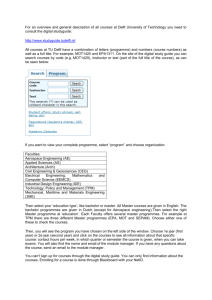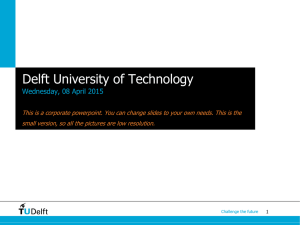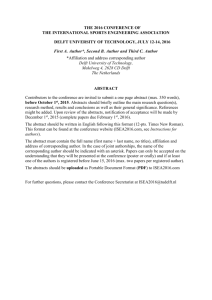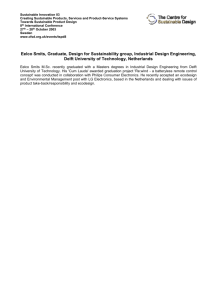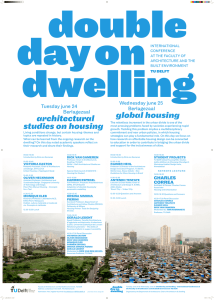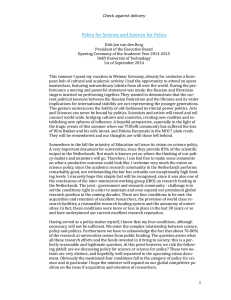ppt - TU Delft
advertisement
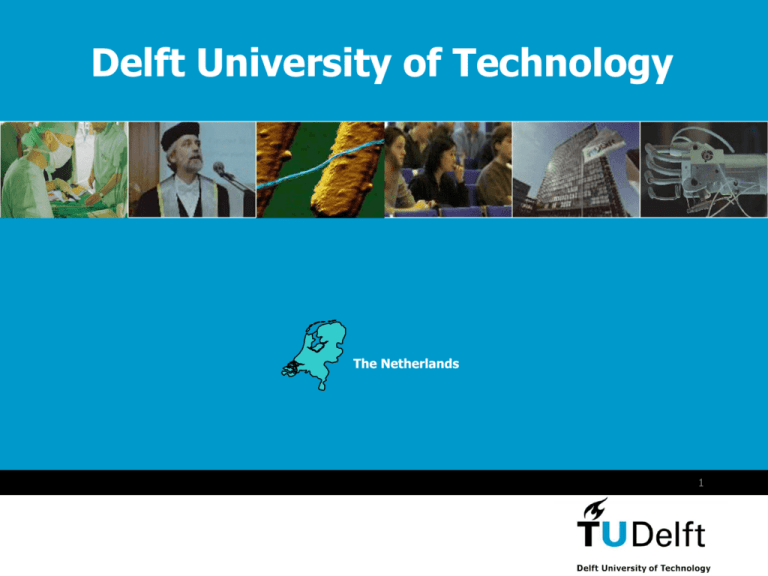
Delft University of Technology The Netherlands 1 Vermelding onderdeel organisatie The logo : Flame of Prometheus Stealing fire from the gods, giving it to man, Prometheus gave technology and development to mankind. About TU Delft Delft University of Technology was founded in 1842 by King William II. It is the oldest and largest University of Technology in the Netherlands. The 8 faculties offer 16 Bachelor’s courses and 29 Master’s courses in comprehensive programmes of education and research. Holland at Sea level 4 Universities in the Netherlands Groningen U Twente Amsterdam Leiden TU Delft Wageningen Utrecht Nijmegen Rotterdam TU Eindhoven Tilburg Maastricht University Students () Utrecht University 23.000 Universiteit van Amsterdam 22.000 University of Groningen 20.000 Erasmus University Rotterdam 16.000 Vrije Universiteit Amsterdam 16.000 University of Nijmegen 15.000 Leiden University 15.000 Delft University of Technology 13.000 Universiteit Maastricht 11.000 Tilburg University 10.000 Technische Universiteit Eindhoven 7.000 University of Twente 7.000 Wageningen University 4.000 TU Delft - characteristics • Excellent (international) ratings • Driven by demands of society • High International reputation • Strong (mono)disciplines • 11 Focussed multidisciplinary research themes 6 Facts & Figures (2004) • • • • • Number Number Number Number Number of of of of of PhD-theses Scientific Publications Spin Offs Patents MSc. 212 5.850 250 52 1.726 7 Major facilities Experimental nuclear reactor Institute of Micro-electronics and Submicron Technology Wind tunnels Water basins for coastal and marine research High voltage engineering laboratory Aerospace facilities (Cessna, Simona, etc.) Large scale radar and telecommunication test facilities Process engineering pilot plants High-performance computer network Scientific and support staff (2004) 5000 4000 3000 2000 1000 0 Scientific staff: fte 2338 Assistant staff: fte 2128 Total staff: fte 4466 Faculties 1. 2. 3. 4. 5. Aerospace Engineering Applied Sciences Architecture Civil Engineering and Geosciences Electrical Engineering, Mathematics and Computer Science 6. Industrial Design Engineering 7. Mechanical Engineering and Marine Technology 8. Technology, Policy and Management 10 Delft Research Centres 60% Faculty’s a b c d 1 2 40% 3 11 Delft Research Centres • Earth: observation, utilization, ecology and engineering • Water: water works, water management and water quality • Information and communication technology • Nanotechnology • Mechatronics and microsystems • Life science and technology • Sustainable energy, extraction, conversion and use • Sustainable industrial processes • Sustainable urban areas • Next Generation infrastructures • Mobility of persons and transport of goods Disciplines Total number of students: 13.382 (2004, excluding Ph.D. students) Aerospace Engineering 1655 Applied Earth Sciences 246 Applied Physics 509 Architecture, Urban Planning and Housing 2998 Chemical and Biochemical Engineering 315 Materials Science 51 Civil Engineering 1420 Electrical Engineering 552 Geodetic Engineering 43 Industrial Design Engineering 1648 Life Science and Technology 184 Mechanical Engineering 1311 Marine Technology 316 Systems Engineering and Policy Analyses 920 Technical Mathematics 212 Technical Informatics 1002 0 500 1000 1500 2000 2500 3000 Students of foreign nationality (2004) 267 Belgium 267 Germany 69 United Kingdom 22 France 18 Greece 23 Italy 30 Rest EU 104 Norway 9 Turkey 26 Eastern Europe 23 Other European countries 6 Indonesia 91 Iran 58 China 260 Other Asian countries 169 USA Surinam Other American countries 14 95 46 Marocco Other African countries 40 33 Oceania Unknown 6 5 260 0 25 50 75 100 125 150 175 200 Education: programmes Graduate study B.Sc. TU Delft B.Sc. foreign Master of Science years 3 2 Selected by admission committees Post graduate study Doctorate Dissertation Scientific research Multidisciplinary design certificate 2 4 Master of Science courses Aerospace Engineering Applied Earth Sciences Applied Mathematics Applied Physics Architecture, Urbanism and Building Sciences Biochemical Engineering Biomedical Engineering Chemical Engineering Civil Engineering Computer Engineering Computer Science (Technical Informatics) Design for Interaction Electrical Engineering Engineering and Policy Analysis Geodetic Engineering Integrated Product Design Life Science & Technology Management of Technology Marine Technology Materials Science & Engineering Mechanical Engineering Media & Knowledge Engineering NanoScience Offshore Engineering Science Education & Communication Strategic Product Design Systems & Control Systems Engineering, Policy Analysis & Management Transport, Infrastructure & Logistics Students of foreign nationality (2004) Europe Asia America Africa Other general via exchange 597 578 155 77 11 381 21 15 3 1418 420 Main objectives internationalisation strategy TU Delft 1. Attracting top talent through mobility & exchange of excellent staff & students 2. Enhancing quality of academic network through strategic international relations 3. Broadening TU Delft through adding international dimension 4. Exchange of best practice: Quality & accreditation 18 International co-operation Education Student exchange (Erasmus) MSc. Education Joint Master Staff exchange (e.g. visiting professors) Research PhD research (Sandwich construction) Post Doc research Joint research Staff exchange Other Benchmarking / Peerreviews Sharing facilities Sharing best practices Enhancing TU Delft position 19 Some international activities of TUD • • • • • • • • • • • • Strategic alliances (IDEA League and a limited number of bilateral institutional partnerships) Strong stimulus of student mobility ( internships, academic exchanges, MSc thesis, etc.) All Master of Science Programs in English language European Credit Transfer System in place (Bologna) International diploma supplement for Bachelor and Master degree (Bologna) ABET accreditation Code of Practice as quality assurance for English as language of instruction at Master level International student population 10 % average (MSc level 14%) (more than 80 nationalities) International visiting professors Research fellowship Program for PhD graduates from partner universities International PhD student population 45 % International summer course (academic and cultural preparation for MSc level) 20 Bilateral co-operation agreements Europe EPF Lausanne (Switzerland) Katholieke Universiteit Leuven (Belgium) Paris Tech (France) Royal Institute of Technology, Stockholm (Sweden) TU Budapest (Hungary) TU Praque (Czech Republic) TU Warschau (Poland) University of Trondheim (Norway) METU - Middle East Technical University (Turkey) Asia Tsinghua University Beijing (China) Shanghai Jiao Tong University, Shanghai (China) Fudan University (China) Kyoto University (Japan) University of Osaka (Japan) University of Tokyo (Japan) Institute of Technology Bandung (Indonesia) National University of Singapore KAIST, Korea Academic Institute for Science and Technology(South Korea) USA Massachusetts Institute of Technology (MIT) University of Michigan, Ann Arbor University of Texas, Austin Georgia Institute of Technology Other Technion Haifa (Israel) Universiteit van Stellenbosch (South Africa) The IDEA League Agreement on strategic partnership; Memorandum of Understanding signed on 6 October 1999 (in Delft) • • • • Imperial College London, United Kingdom TU Delft, The Netherlands ETH Zürich, Switzerland RWTH Aachen, Germany 22 IDEA League strategic cooperation • Top Quality Technical Universities in Europe • Collaboration in education & research • Participation in European programmes • Political visibility and clout • Benchmarking • Exchange of best practices 23 Head office TU Delft campus Applied Earth Sciences 26 Aerospace Engineering 27 Nuna II: Solar World Champion 2003 28 Medical equipment Life Sciences Architecture Traffic Off Shore / Oil 29 ADDITIONAL INFORMATION 30 The yearly programme Based on 2 semesters, each consisting of lectures exercises laboratory work homework one week for preparation Followed by three weeks of examinations Average study load per year 60 European Credits (1600 hours) Research schools ASCI BOUW BSDL JM BURGERS CTG DIMES DISC TRAIL Computing & Imaging Advanced Studies in Construction Biotechnological Sciences Delft Leiden Fluid Dynamics Technical Geoscience Micro-Electronics and Submicron Technology Systems and Control Transport, Infrastructure and Logistics Research institutes Adhesion Adhesion DIDE Sustainable Energy DISENS Intelligent Sensor Microsystems DITSE IT in Service Engineering INTERDUCT Clean Technology IOE Offshore Technology IRCTR Telecommunications-transmission and Radar IRI Reactor Institute KOITER Engineering mechanics OTB Policy Sciences and Technology SIMONA Simulation, Motion and Navigation Technology KOITER Computational Mechanics DEOS Earth Observation DUWIND Wind Energy Dissertations (Ph.D.) Number of doctorates 4000 1st 1000 Ph.D’s 68 years 2nd 1000 Ph.D’s 17 years 3rd 1000 Ph.D’s 6 years 3000 2000 1000 0 1900 1910 1920 1930 1940 1950 1960 1970 1980 1990 2000 Admission Requirements for the Master of Science courses Relevant Bachelor’s degree (or equivalent) GPA (Grade Point Average) of the B.Sc. study of 75 % Toefle score (Test of English as a foreign language) of 550 points or IELTS 6.0 (Overall band grade) GRE General test (Graduate Record examination) – 450 verbal, 550 or 3.5 analytical, 650 quantitative An essay written in English by the applicant with his/her motivation Additional testing and/or a personal interview if required by the selection committee Cooperation between Tsinghua University, Beijing and TU Delft • Statement of Intent, October 15, 1982 • Memorandum of Understanding, April 4, 1986 • Agreement for Scientific and Academic Cooperation, June 7, 1993 • Agreement for Scientific and Academic Cooperation, May 28, 1999 • Memorandum of Understanding on Cooperation in the field of Micro-electronics (IMETU and DIMES), April 28 2001 • Agreement for Scientific and Academic Cooperation, January 31, 2005 36 Main subjects in the cooperation between TU Delft and Tsinghua University January 2004 • • • • • • • • • • Mechanical Engineering: Numerical simulation of turbulent flow Applied Physics: Image processing and analysis Electrical Engineering: Microelectronics process technology Materials Science: Bainite formation in steel Management of Technological Innovation/National Entrepreneurship European postgraduate Master in Urbanism: Strategies and design for cities and territories Civil Engineering: Fatigue behaviour of steel highway bridges ; Static and fatigue behaviour of connections; Collapse of pipelines; Fibre-reinforced plastics in civil engineering structures Aerospace Engineering: Fracture and damage Mechanics Mathematics and Computer Science: HPC and Grid Computing ICT: Video compression and digital watermarking 37 The Fudan & TU Delft International School of Microelectronics Shanghai, MOU of January 23, 2003 • MSc programme in Microelectronics: • A joint initiative in high standard education in microelectronics which will play a significant role in the development of Shanghai as a global centre of microelectronics. • Important provider of well qualified personnel in the IC industry. • In close collaboration with the key industry • Industrial affiliation programme (internships, scholarships) 38 Overall Gain for TU Delft through IDEA League November 1999 – November 2004 • • • • • • • • • Use of educational quality management principles to ensure internal quality assurance A framework for benchmarking on a European scale In-depth comparison of curricula on level, content and quality = equality of Bachelor level Use of jointly developed qualification profiles for Bachelor and Masters Use of jointly developed diploma supplement Horizontal and vertical mobility Exchange of good practices in internationalisation, PhD inflow, diploma evaluation, admissions, communication & marketing, equality issues, alumni Framework for joint education projects Enhanced international status (with positive effects on international labour market, peerreviews, international accreditation agencies, recruiting, etc.) 39 Gain for TU Delft through IDEA League Cooperation in Education and Research • • • • • • • • Benchmarking and exchange of good practices Joint curriculum comparison and development Student mobility - vertical and horizontal Research collaboration: European Research projects (7th framework) PhD exchanges - staff exchanges Peer reviews by partners as part of self studies Erasmus Mundus, joint Masterprogrammes Summer schools, workshops 40 Revenue 2004 [in M€] Government funding Tuition Contracts and sales Miscellaneous 329 21 79 17 446 TU Delft library and congress centre Dutch education system Binary System: Academic (Research Oriented) MSc / BSc MA / BA Professional > Bachelor (bc) Admission Requirements for the Master of Science courses Relevant Bachelor’s degree (or equivalent) GPA (Grade Point Average) of the B.Sc. study of 75 % Toefle score (Test of English as a foreign language) of 550 points GRE general test (Graduate Record examination) of at least 550 average An essay written in English by the applicant with his/her motivation Additional testing and/or a personal interview if required by the selection committee Organisation Minister of Education, Culture and Science Executive Board Works Council University Corporate Office Students Council Operational Committee (Board & Deans) Service Departments Research schools Institutes Research Themes Faculty Faculty Faculty 1 2 8 Scientific staff: fte 2338 2500 2000 1500 Full professors: fte 193 Associate professors: fte 251 Assistant professors: fte 330 1000 PhD-students: fte 811 500 0 Other: fte 753 International alliances: IDEA League Imperial College London (UK) TU Delft (The Netherlands) ETH Zürich (Switzerland) RWTH Aachen (Germany) Optimization group in Delft
